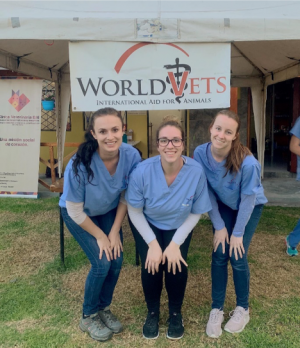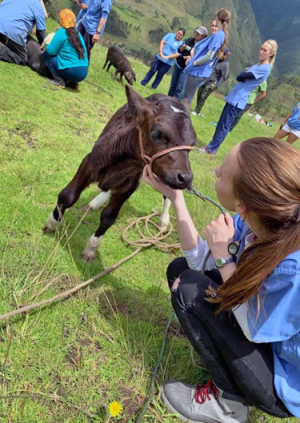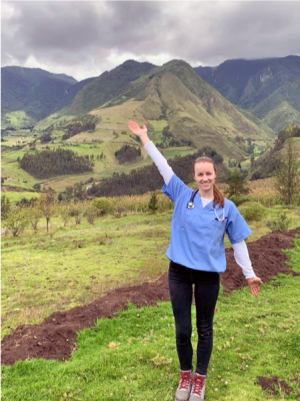By Jen Lauer, DVM Class of 2022

Thanks to a scholarship I received from the MSU College of Veterinary Medicine’s International Programs unit, I spent one week of my summer in Otavalo, Ecuador with the World Vets Organization. The purpose of the program was to provide free spays and neuters, as well as preventative medicine, to the pets of locals. We performed surgeries for three days in Otavalo, and for one day, we practiced and learned about preventative medicine in a community in the Andes Mountains.
On the surgery days, we were in three-person teams—one veterinarian and two veterinary medical students. The veterinarian aided the veterinary student, who was the surgeon for the patient, while the other veterinary student monitored the patient and made sure it stayed under sedation. There was no anesthesia; the patients were kept under with Ket/Val or “kitty magic.” We were taught how to check their level of sedation, and to administer more when needed. It was scary at first, that there wasn’t a machine there to tell me the animal’s heart rate, blood pressure, SPO2, temperature, etc., but I am so grateful for the experience; it taught me how to monitor a patient and keep its vitals stable throughout a surgery on my own, without the need to rely on a machine. In practice, it’s possible for the machines to be wrong, or even not work while in surgery, so I think this is a very useful skill to have.

On the community outreach and preventative medicine day, when we were in the Andes Mountains, people from the area brought their animals to us for preventative medicine. We primarily gave vaccines and de-wormers to dogs, cats, horses, cattle, and pigs. We also performed hoof trims on some sheep that were brought to us. It was fun to get to work with sheep and pigs, as I didn’t have much experience with them before this trip.
On this day, the community outreach and preventative medicine day, we also did a lot of client communication; we had to inform them on the preventive medicines we offered and why they are important. The locals didn’t speak much English, so it was difficult to communicate at times. However, that can happen a lot in practice, so I think it’s valuable to have the ability to be patient and make a real effort to try to make sure the client understands; this goes a long way and makes them feel like you really do care for their pet.

Overall, this experience had such a positive impact on me. I gained surgical experience when I performed two dog neuters, two cat spays, and three dog spays alongside a veterinarian. I gained client communication skills and overcome a language barrier. I gained knowledge in patient monitoring when general anesthesia was not available. Most importantly, I gained insight as to how veterinary medicine can be different in other countries. In Ecuador, dogs roam the streets, some not even owned by people, yet the community pitches in to care for them. In addition, the supplies to care for animals are limited, especially when compared to what we have access to here in the United States.
I love to travel and see new places. I would love to visit as many places around the world as I can and provide veterinary care when I’m there. In fact, I plan to do an abroad trip again next summer! When I’m a veterinarian, I would love to participate in these programs as well. I hope to teach and inspire the veterinary medical students, and to show them how much there is to appreciate about the veterinary field worldwide!
